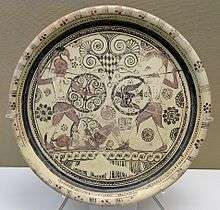Euphorbus
In Greek mythology, Euphorbus (Ancient Greek: Εὔφορβος; or Euforbo) was a Trojan hero during the Trojan War.

Description
Euphorbus was a handsome man described to have the loveliest locks among the curly-haired. He had a lot of gold bound into his braid of hair along with other ornaments around his head.[1]
Family
Euphorbus was the son of Panthous and Phrontis according to Homer[2] and thus brother to Polydamas and Hyperenor. But according to Orpheus, his parents were the naiad Abarbarea and Boucolides, illegitimate son of Laomedon,[3] and probably the brother of the twins Aesepus and Pedasus.
Mythology
Euphorbus wounded Patroclus before the Achaean hero was killed by Hector[4] or according to Tzetzes, he was the second to strike Patroclus for the god Apollo was the first one.[5] In the fight for Patroclus' body, Euphorbus was killed by Menelaus.[6] He was apparently one of Troy's finest warriors. Menelaus later took Euphorbus' shield to the temple of Hera in Argos. There are some accounts that claim that it was Euphorbus, not Aeneas, Cycnus or Hector, that killed Protesilaus.
The philosopher Pythagoras claimed to be a reincarnation of Euphorbus, according to Heraclides of Pontus (as reported by Diogenes Laërtius)[7] and Philostratus.[8] In the Metamorphoses of Ovid (15, 160–164), Pythagoras is again said to have claimed to be a reincarnation of Euphorbus.
See also
- 4063 Euforbo, Jovian asteroid
- List of Greek mythological figures
References
- John Tzetzes. Chiliades, 1.8 lines 230-234
- Homer. Iliad, 17. 81
- John Tzetzes. Chiliades, 1.8 line 229 & 13.37 line 575
- Homer. Iliad, 16.786–16.857.
- John Tzetzes. Chiliades, 4.2 line 32
- Homer. Iliad, 17.9–109.
- Diogenes Laërtius. Lives and Opinions of Eminent Philosophers, VIII, 4.
- Philostratus, Life of Apollonius of Tyana, 8.7.iv, online at Livius.org